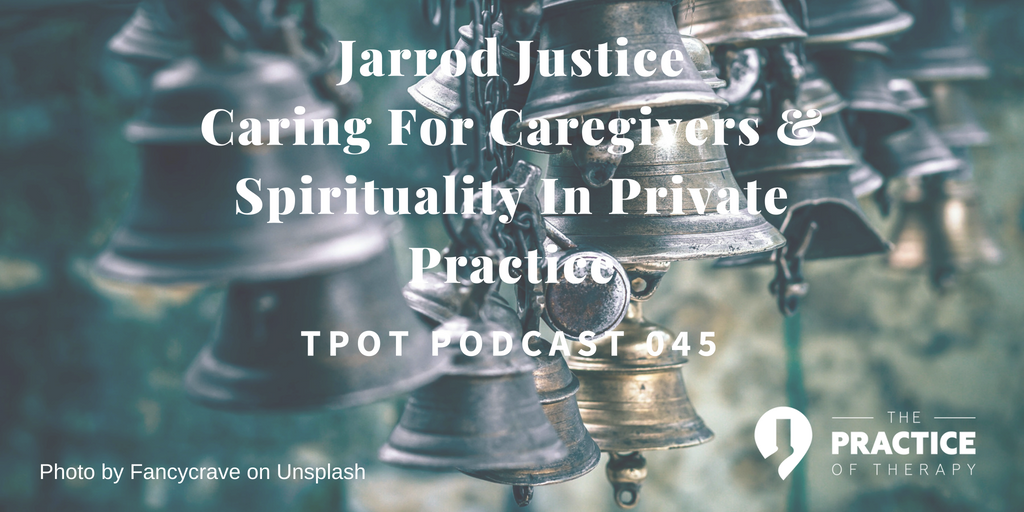
In this episode of the Practice of Therapy Podcast, Gordon talks with Jarrod Justice about caring for caregivers and the importance of self-care in this field. They also talk about spirituality how that can be an influence for people in their lives. Gordon and Jarrod have a conversation about how they both have what that consider “faith informed” practices. Both are clergy people and they talk about how this influences the way they do therapy and the ethical considerations they both take in their practices.
Meet Jarrod Justice
 Jarrod Justice, MAMFT, is a post-master’s counselor in Knoxville specializing in marriage and family therapy. He currently works at Haven Family Psychiatry with clients who are experiencing: anxiety, depression, sexual health issues, relationship concerns, and challenging family dynamics.
Jarrod Justice, MAMFT, is a post-master’s counselor in Knoxville specializing in marriage and family therapy. He currently works at Haven Family Psychiatry with clients who are experiencing: anxiety, depression, sexual health issues, relationship concerns, and challenging family dynamics.
Jarrod has worked as a Christian minister for over a decade in Knoxville—serving in various roles as a college pastor, worship leader, and lead pastor. He also has experience working for a local non-profit called With Inc., where he provided mentorship and soul care to individuals, couples, and ministers in need.
Jarrod graduated from Baylor University in 2003 with a B.A. in International Studies, and recently graduated from Richmont Graduate University with a M.A. in Marriage and Family Therapy. Jarrod loves people and wants to offer his clients hope and courage on life’s journey.
He is a current member of the (AAMFT) American Association of Marriage and Family Therapists, and is an active member of the (CLC) Christian Leadership Concepts in Knoxville. Originally from Texas, he has called East Tennessee home for nearly 14 years. In his personal time, other than good coffee and great music—he enjoys meaningful dates with his wife, peanut butter, and watching his three boys play baseball.
“Faith Informed” vs. “Faith-Based”
One designation or niche that many therapists and counselors identify with is around spirituality. For some, this very much informs who they are as people. For others, not so much. Gordon and Jarrod discuss how they have both landed in what they refer to as “faith informed” practices.
A “faith-based” practice differs from a “faith informed” practice in that a “faith-based” practice usually has some sort of direct affiliation with a religious organization (church, synagogue, mosque, etc.). Whereas a “faith informed” practice really has to do with the therapist and how they might approach their work with people.
Both Gordon and Jarrod are clinically trained in the traditional sense and use evidence-based approaches with clients. And when religion comes up, if it comes up, they are both very comfortable discussing those things with clients.
Caring for Caregivers
One of the things that Jarrod has noted in his own journey is that clergy or pastors can find themselves very isolated at times. Jarrod talks about how pastors and religious leaders can have a lot of external pressure from their “flock”. Pastors and clergy are very much in the business of caregiving, not unlike therapists and counselors. And over-time if the caregiver is not being cared for, it can quickly lead to “compassion fatigue”.
An important part of this whole thing is also learning self-care and learning how to manage your own emotions well. Clergy and counselors alike, get handed a lot of heavy stuff from our clients and parishioners. It is so important to know how to process that “stuff” well and seek the support you need in handling that.
Knowing Yourself Well
Jarrod and Gordon also talk about the importance of knowing yourself well and knowing how to not only process other people’s emotions but knowing how to process our own well. In many ways, we need to develop our own emotional intelligence just like we do in helping our clients.
They talk about the importance of seeking therapy and/or pastoral care for ourselves as caregivers. We all need a safe place to process our issues and be vulnerable. We all need a place to process and be heard.
Making Genuine Connections
Jarrod talked about the need we all have to make genuine connections and connect with people on more than a superficial level. With all the social media we are exposed to, Jarrod makes the analogy of eating fast food vs. eating healthy food. In many ways, the connections we make through social media is like eating fast food. It fills us up and stops the hunger temporarily, but in the long run is not as healthy for us. What we really need and want are those relationships that are more meaningful and help us connect at a deeper level.
People Want to Know Their Therapist
One interesting thing about how people choose therapists has a lot to do with the commonalities they see themselves having with a potential therapist. (See the previous podcast with Jeff Geunther, Episode 044). Depending on your client demographics and where you are located, religion might be an important cultural factor. For some, religious affiliation is an important piece. Gordon and Jarrod talk about their approach to this in that they disclose to clients their religious affiliation, but at the same time express NOT having a “religious agenda” with their counseling.
Both Gordon and Jarrod are clinically trained in the traditional sense and use evidence-based approaches with clients. And when religion comes up, if it comes up, they are both very comfortable discussing those things with clients.
Integrating Spirituality In Therapy Practice
Jarrod and Gordon talk about giving people the space to talk about spiritual matters. Jarrod mentions that he asks clients if they want to talk about spiritual matters. Both Gordon and Jarrod talk about the importance of being sensitive to differing views and how people’s spiritual experiences can be painful for them to talk about. For example, someone being emotionally abused by people in their faith communities.
Ultimately, who we are as therapists does come into the therapy room. Being able to share those parts of ourselves with others in a way that is validating of their life experiences and their personal beliefs is important. It is possible to be spiritual without pushing a religious agenda or other convictions onto others.
Resources Mentioned:
Jarrod’sTherapy Practice – Haven Family Psychiatry
Join A Mastermind Group with Gordon
Meet Gordon Brewer, MEd, LMFT
Gordon is the person behind The Practice of Therapy Podcast & Blog.He is also President and Founder of Kingsport Counseling Associates, PLLC. He is a therapist, consultant, business mentor, trainer and writer. PLEASE Subscribe to The Practice of Therapy Podcast on iTunes, Stitcher and Google Play. Follow us on Twitter @therapistlearn and Pinterest “Like” us on Facebook.

